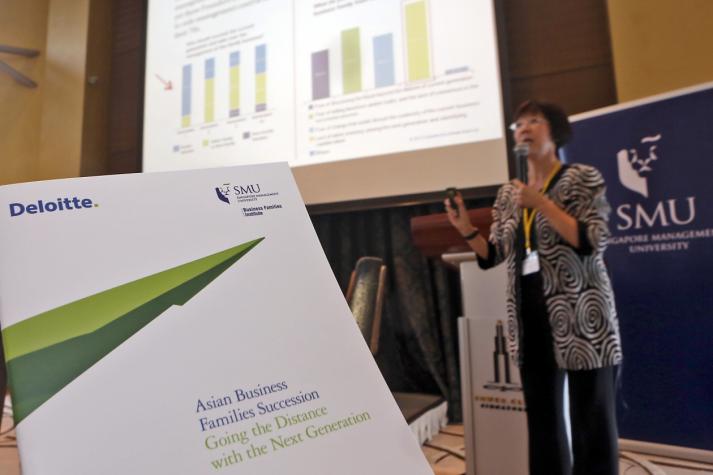
Nearly 90% of the business families said that Business Family Management Succession is important to them and 81% of them believe that their Next Generation will be able to succeed and manage the family business. There was also generational consensus that the next generation should take over management control of the family business in their 30s and 40s. Additionally, Non-Family Advisors have a key role to play in succession planning – a significant 77% of business families said they would be open to Non-Family Advisors facilitating succession.
These were some of the key findings published in a pioneering research report entitled ‘Asian Business Families Succession – Going the Distance with the Next Generation’, which SMU’s Business Families Institute, or BFI@SMU, and Deloitte jointly launched earlier this month.
The comparative research survey conducted by BFI@SMU between August and October 2013, covered various countries in Asia, namely Singapore, Indonesia, Malaysia, Thailand, The Philippines and Vietnam. The inaugural research survey, made possible by a research gift from Deloitte Southeast Asia, provides thought leadership on the current sentiments of business families on succession issues, as well as the strategies and structures related to Next Generation Training and Non-Family Advisors facilitating succession transitions.


[Photo: SMU’s Associate Professor Annie Koh presenting the results of the pioneering research on ‘Asian Business Families Succession – Going the Distance with the Next Generation’.]
About half of the business families felt that they were in the developmental stage of the succession planning cycle which, the survey found, would takes at least 25 years. When asked about their medium term (three to five years) priorities, respondents highlighted: ‘Expanding into New Markets’ (80%), ‘Growing New Lines of Business’ (70%), and ‘Research and Development’ (61%). ‘Mergers & Acquisitions’ features as a long term (five to ten years) priority for 51% of the business families surveyed.
“Compared to business families in the US and in Europe, family businesses in Asia are still in their infancy stages. There are also limited research data and resources available in this part of the world. The knowledge that we have been able to gather from this pioneering study is therefore going to be very valuable and insightful to Asian business families, and will facilitate openness and learning, knowing that they are not alone in wanting more developmental platforms to facilitate succession,” said Associate Professor Annie Koh, SMU’s Vice President, Business Development and External Relations, and Academic Director of BFI@SMU.
“In particular for BFI@SMU, the insights on their business priorities and the desired training for their Next Generation, as well as how they view the participatory role of trusted non-family advisors, are certainly affirmation that we are well-serving their needs of enhancing the quality and lifespan of their businesses,” she added.
The research had revealed that to facilitate the pursuit of their business priorities as well as management succession, business families felt that they would benefit from training and development in three broad areas of Family, Investments and Succession covering specific subjects such as Conflict and Communication, Family Governance, Family Leadership and Family Talent Development, Family Investments, Family Office, Trans-Generational Entrepreneurship and Succession Planning.

[Photo: (Left to right): Moderated by Associate Professor Annie Koh, the panel comprising Mr Rehan Amarasuriya, Mr John Riady, Ms Jamie Lim and Mr Neo Tiam Boon, shared their experiences and insights into the succession process and challenges within their own family businesses.]
The research also found that ‘Trusted Non-Family Advisors’ have a significant role to play in facilitating the succession of family businesses. They were viewed as a valuable resource to facilitate succession transition. Most of the business families surveyed also felt that these advisors would be in a good position to mentor the Next Generation for critical roles in the business, exercise objective judgment with minimal emotions, facilitate succession, and manage conflict.
Given the challenges of succession planning, business families felt that developing a clear succession plan that involves the Next Generation and Trusted Non-Family Advisors would facilitate the succession transition process.
At the launch event, the audience, which included some of the regional business families who participated in the survey, was treated to a candid and insightful sharing by four business family representatives – Ms Jamie Lim, Regional Marketing Director, Scanteak; Mr John Riady, Dean, Universitas Pelita Harapan and Founder & Editor, BeritaSatu; Mr Rehan Amarasuriya, Director, BP de Silva Holdings; and Mr Tiam Boon Neo, CEO, TA Corporation Limited. They represent the second to fifth generation successors of their respective family businesses.

[Photo: (from left to right) Associate Professor Annie Koh, Mr Rehan Amarasuriya, Mr John Riady, Ms Jamie Lim, Mr Neo Tiam Boon and Mr Tam Chee Chong.]
Commenting on the collaboration with BFI@SMU, Mr Tam Chee Chong, Regional Managing Partner of Financial Advisory Services at Deloitte Southeast Asia, said, “Deloitte has worked with many business families over the years whose vitality, stability and dynamism have contributed significantly to the business landscape of the region… The findings of the survey highlight numerous areas where owners, management and family members can take note of in ensuring the efficacious success of business families and preservation of family wealth for future generations.”